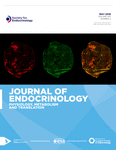Progesterone-induced activation of membrane-bound progesterone receptors in murine macrophage cells
- 1Department of OB/GYN, NorthShore University HealthSystem, 2650 Ridge Avenue, Evanston, Illinois 60201, USA
2Department of OB/GYN, Pritzker School of Medicine, University of Chicago, 924 East 57th Street Suite 104, Chicago, Illinois 60637, USA
- Correspondence should be addressed to J Lu; Email: jlu{at}northshore.org
Abstract
Parturition is an inflammatory process mediated to a significant extent by macrophages. Progesterone (P4) maintains uterine quiescence in pregnancy, and a proposed functional withdrawal of P4 classically regulated by nuclear progesterone receptors (nPRs) leads to labor. P4 can affect the functions of macrophages despite the reported lack of expression of nPRs in these immune cells. Therefore, in this study we investigated the effects of the activation of the putative membrane-associated PR on the function of macrophages (a key cell for parturition) and discuss the implications of these findings for pregnancy and parturition. In murine macrophage cells (RAW 264.7), activation of mPRs by P4 modified to be active only extracellularly by conjugation to BSA (P4BSA, 1.0×10−7 mol/l) caused a pro-inflammatory shift in the mRNA expression profile, with significant upregulation of the expression of cyclooxygenase 2 (COX2 (Ptgs2)), Il1B, and Tnf and downregulation of membrane progesterone receptor alpha (Paqr7) and oxytocin receptor (Oxtr). Pretreatment with PD98059, a MEK1/2 inhibitor, significantly reduced P4BSA-induced expression of mRNA of Il1B, Tnf, and Ptgs2. Inhibition of protein kinase A (PKA) by H89 blocked P4BSA-induced expression of Il1B and Tnf mRNA. P4BSA induced rapid phosphorylation of MEK1/2 and CREB (a downstream target of PKA). This phosphorylation was inhibited by pretreatment with PD98059 and H89, respectively, revealing that MEK1/2 and PKA are two of the components involved in mPR signaling. Taken together, these results indicate that changes in membrane progesterone receptor alpha expression and signaling in macrophages are associated with the inflammatory responses; and that these changes might contribute to the functional withdrawal of P4 related to labor.
- Received in final form 21 November 2014
- Accepted 3 December 2014
- Made available online as an Accepted Preprint 3 December 2014
- © 2015 Society for Endocrinology











